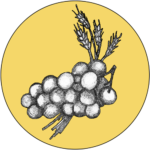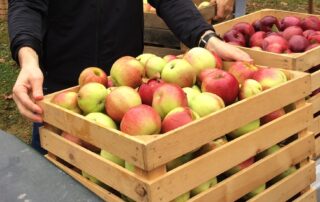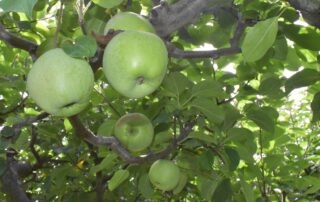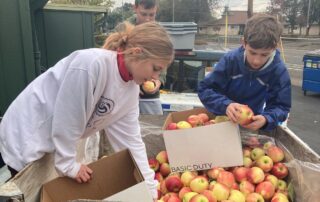 Pillar: Sacramental Ecology
Pillar: Sacramental Ecology
Laudato Si’ Action Plan Goals: Response to the Cry of the Earth, Ecological Spirituality, Community Engagement and Participatory Action
 Pillar: Sacramental Ecology
Pillar: Sacramental Ecology
Laudato Si’ Action Plan Goals: Response to the Cry of the Earth, Ecological Spirituality, Community Engagement and Participatory Action
Group (Grade Levels): Intergenerational experience – family experience
Learning Goals:
- Learn and appreciate God’s gifts in creation and in others and our call to work to honor those gifts.
- Understand life’s processes, especially the phase of completion before a new cycle begins.
Materials Needed: baskets, ladders, wheelbarrows/carts, bags/aprons with big pockets, sting relief, water, cups
Estimated Time to Complete Activity: 2 hours recommended
Estimated Number of Sessions if Activity Continues: can be repeated if desired and/or followed by other suggested experiential learning sessions. (See cross-references at end of lesson.)
General Outline of Experience
- Begin by proclaiming the Gospel passage from Luke 10:2 “Jesus told them, ‘The harvest is plentiful, but the workers are few. Ask the Lord of the harvest therefore to send out workers into his harvest field.’”
- Lead a discussion with the following questions:
- What did Jesus mean by “the harvest is plentiful?” [Hint: Before this passage, Jesus had been healing, preaching, and casting out demons.]
- Who are the workers in God’s harvest?
- What does this passage mean to you?
- Close the Gospel reflection with a prayer such as the Our Father, Glory be, the Hail Mary, or a spontaneous prayer.
- Lead a discussion with the following questions:
- Suggested Laudato Si’ quotes:
- Laudato Si’, n. 1: “‘LAUDATO SI’, mi Signore– Praise be to you, my Lord.’ In the words of this beautiful canticle, Saint Francis of Assisi reminds us that our common home is like a sister with whom we share our life and a beautiful mother who opens her arms to embrace us. ‘Praise be to you, my Lord, through our Sister, Mother Earth, who sustains and governs us, and who produces various fruit with coloured flowers and herbs.’”
- Laudato Si’, n. 71: “The biblical tradition clearly shows that this renewal entails recovering and respecting the rhythms inscribed in nature by the hand of the Creator. . . [The Jubilee year] was an acknowledgment that the gift of the earth with its fruits belongs to everyone. Those who tilled and kept the land were obliged to share its fruits, especially with the poor, with widows, orphans and foreigners in their midst: ‘When you reap the harvest of your land, you shall not reap your field to its very border, neither shall you gather the gleanings after the harvest. And you shall not strip your vineyard bare, neither shall you gather the fallen grapes of your vineyard; you shall leave them for the poor and for the sojourner’ (Lev 19:9-10).”
- Let participants know that today we are executing the culminating part of a long process that has involved a lot of hard work by many people. We get to join in the process!
- Give each participant an apple, and let them know it was harvested today.
- Francis was familiar with the importance of work. He said playfully:
- “Go your way, brother fly, for you want to eat the sweat of your brothers and to do nothing in God’s work. You are like brother drone who wants to be first to eat the honey, though he does not do the work of the bees.” (2 Celano, 75)
- He also said: “By working man administers the dominion of God in creation, and thus, in God’s image and likeness, renders visible the hidden Creator” (Cajetan Esser, O.F.M., The Rule and Testament of St. Francis, Chicago: Franciscan Herald Press, 1977, p. 140).
- We do not want to be haphazard workers! We should try to put our best into our work.
- A good worker is observant of the environment and that is what we’ll practice today.
- Key concluding point: We work hard to make things grow. We want our labor to be fruitful. Harvesting is a time of verification, an “a-ha moment.” What we harvest is called to be shared, it is the fruit for the work of human hands, and as we share it, we share of ourselves. As we harvest, we work together, everyone with his/her own gifts and talents.
- Indicate to participants what signs they need to observe to know if the apple is ready for picking.
- Observe the apple you have in your hand. What signs did the apple give to let someone know it needed to be picked? Do you think your apple was picked too early or too late?
- Explain and demonstrate how to pick the apples and how to gently care for them in a spirit of reverence.
- Explain how to sort the apples according to their level of maturity and integrity (different buckets for bruised apples, perfect apples, bitten apples, diseased apples, apples for compost).
- Explain safety (be aware of stinging insects, be careful with ladders).
- Divide participants in teams, at least three people per each tree; preferably each group will be made up of participants of different ages to highlight the importance of collaboration.
- Distribute materials (aprons, bags).
- Send participants out to harvest.
- When completed, gather participants to sit under an apple tree and enjoy the fruit with caramel sauce or other snacks.
- Proposed discussion questions:
- What was your harvesting experience like? What were some challenges and some joys?
- Where did the apple come from?
- What are the conditions necessary to bring the apple to life? What is offered by God through nature is combined with the work of our human hands (pruning, thinning, spraying, waiting, monitoring, praying, etc.).
- What are the challenges that arise along the way? (frost, birds, deer, diseases, pests, flooding, drought. . . )
- Read again Luke 10:2: “He told them, the harvest is plentiful, but the workers are few. Ask the Lord of the harvest therefore to send out worker into his harvest field.”
- What will happen if there were no one to pick the fruits?
- Who are the laborers Jesus is talking about?
- Would you like to be one of the Jesus’s workers?
- Why did they call him the Lord of the harvest?
- Potential analogies:
- Bruised apples (show the marks on the outside, and sometimes the bruises show up later, though they are already there): Analogy with “bruised” human relations.
- Analogies with life processes: Waiting for the fruit to grow, need for pruning and thinning, etc. in order to be honest to each step of the process; otherwise we will not have a good harvest of fruit.
- Analogies with the mysteries of life, death and resurrection (Paschal Mystery): The tree gives up its fruit to nourish others, analogous to the paschal mystery. Next spring the process will begin again.
- What do we harvest in our daily lives? What is the ultimate harvest? (eternal life in Heaven)
- Matthew 7:7-18: Reflect on our personal gifts and how they are used.
- Consider using this quote from St. Francis, which Pope Francis uses in paragraph 1 of Laudato Si’, during prayer time: “Praise be to you, my Lord, through our Sister, Mother Earth, who sustains and governs us, and who produces various fruit with coloured flowers and herbs” (Canticle of the Creatures, in Francis of Assisi: Early Documents, vol. 1, New York-London-Manila, 1999, 113-114).
- Other suggested Scripture Passages: Matthew 7:7-11, Matthew 7:16:20
- “Ask and it will be given to you; seek and you will find; knock and the door will be opened to you. For everyone who asks receives; the one who seeks finds; and to the one who knocks, the door will be opened. “Which of you, if your son asks for bread, will give him a stone? Or if he asks for a fish, will give him a snake? If you, then, though you are evil, know how to give good gifts to your children, how much more will your Father in heaven give good gifts to those who ask him!”
- “Do people pick grapes from thorn bushes, or figs from thistles? Likewise, every good tree bears good fruit, but a bad tree bears bad fruit. A good tree cannot bear bad fruit, and a bad tree cannot bear good fruit. Every tree that does not bear good fruit is cut down and thrown into the fire. Thus, by their fruit you will recognize them.”
- Additional theme for discussion: Working together/working as a family
- How do I see my work as gift from God? How do I see the work of my family/community (class, race, group of people)?
- How do I see my work fitting into God’s plan? Do I see my work as a vocation, a calling?
Cross-references to related experiential activities: Garden Work, Gardening as Community Service, Composting, Cooking Together, Canning and Food Processing




